

 |
 |
||||
| Home | Reviews | Extras | Forums |
|
Princess TutuSynopsisOnce upon a time, there was a battle between a prince and a raven. It raged on for quite some time, and only ended when the prince took his own heart and shattered it upon his sword. The crow was sealed away, but at a terrible cost. Without his heart, the prince lost all his emotions as his heart shards scattered everywhere. "I want to help him" a girl's voice said, "but... how can I, when I'm just a duck?" "Oh, but you can..." a mysterious voice answers her call, "...as long as you do something in return for me. Won't you tell me a story?" ReviewI have, on some occasions, been called to task on whether I have the right to review any magical girl anime, seeing as they are generally among my least favorites as genres go. However, all that really means is that I'm less likely to be looking for any shows like that. There is a difference in lack of interest and quality, though, which is where the crux of the argument lies. 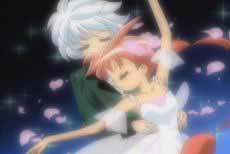 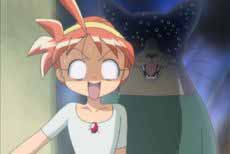 Princess Tutu isn't just a magical girl anime either, but a magical girl ballet anime. So, that's two strikes against the show already for me in the sense of it having two elements I generally don't care for. At all. So why is this show so utterly, utterly awesome? In many ways, Princess Tutu feels more like an old fairytale. In fact, the show is more like a fairytale within the fairytale, starring a storyteller's unfinished story and the people who are caught up within it. It's a little bit different from other shows of this kind I've watched before; like Snow Queen for instance. The art style in Princess Tutu is a mixture between somewhat childish character designs and bizarre background works. Our heroine, Duck, is a spazzy little girl prone to suffering panic attacks, sporting weird expressions and entertaining the audience with visual gags aplenty. Whenever she says "quack", she reverts to being a duck until she dunks herself into any body of water handily nearby. Expect this to happen a lot in the show, at least a good way into the story. That said, her energetic honesty is a delight to behold, even in a gigantic theater-like piece like this. Her personality when turning into Princess Tutu is a good deal different, but still close enough to make you wonder whether this is actually Duck's own personality with the added confidence the transformation grants her. 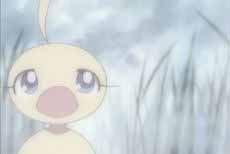 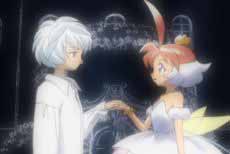 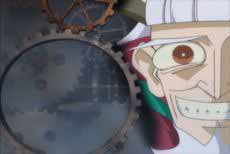 The target of her feelings is a somewhat enigmatic character known as Mythos. He's a seemingly emotionless young man who seems to go through life in the village with a lethargic non-awareness of his situation. It is revealed early in the show that he is the prince whose heart was shattered in the story, and eventually the one whom Duck sets out to reclaim his lost heart pieces by turning into Princess Tutu, much to the annoyance of Fakir, Mythos' near-constant companion. Fakir might at first come across as a villain. He's almost always angry, and seems hell-bent on keeping Mythos under control, preferably locked away where noone can reach him. He's brusque in his dealings with just about anyone, although he also tends to avoid most people. He nevertheless runs into Duck a lot, mostly because of Duck's attempts to free Mythos' heart pieces often puts her in direct confrontation with Fakir. But Fakir also has to deal with Mythos' self-appointed fiances, Rue. Rue is easily as ambigious as Fakir. At the town, she is the star ballerina among the students in the ballet school Duck attends. She's not quite as abrasive as Fakir, but her generally serious demeanor and no-nonsensical attitude often puts her at odds with him. She might also have a few secrets of her own, and her part in this show is large, to say the least. There's also the matter of the occasional antromorph character, like the anteater who drops in for a dance in the second episode in a scene that might as well have been taken out of the animal ballet segment of Fantasia. Or the ballet teacher, mr. Cat, who threatens his students with marriage if they don't perform well. They are all side characters, though heaven knows Princess Tutu goes that extra mile when including them in the story. In the center of it all sits Drosselmeyer, the one who wrote the original unfinished story and also the one to grant Duck the powers to become Princess Tutu when the situation calls for it. He seems to have his own ideas of what constitutes a great story, which makes it hard to figure out where his allegiance lies. Given the amounts of twists and turns in the story, don't expect to figure it out for a while either. 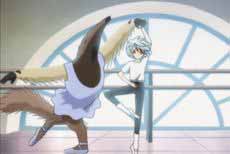 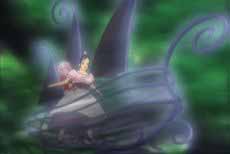 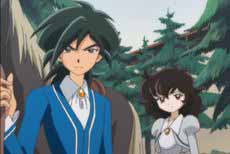 Furthermore, the music in Princess Tutu is amazing. This, in part, is because the show borrows a lot of classical music for its soundtrack, like the Nutcracker Suite or Swan Lake, amongst other pieces. It's an excellent choice for a show based around ballet and classical folk tales, and this is, in part, why I found it such a treat. The blend of styles is intriguing, that's for sure, and the music fits it like a glove. Princess Tutu is like a theatrical performance in so many ways. I've already gone through the music and the dance, and the story fills the stage with what is essentially a classic in so many ways, yet not the kind you often see in magical girl shows OR classical tales. I don't know whether the other aspects of Princess Tutu will scare away the average magical girl anime fan or not, but if there is any love in your heart for old tales or classical music -- or, well... ballet dance -- this show is not one to miss out on. Princess Tutu, the dance of the ages. Watch it! — Stig Høgset Recommended Audience: While the show can be very cute and unassuming, it does fairly often draw on darker elements of the fairy tale tradition such as death, sacrifice, and maiming. While the show doesn't present graphic images of violence, they are discussed. Version(s) Viewed: R1 DVD, bilingual Review Status: Full (38/38) Princess Tutu © 2002 Hal Film Maker / BS2 / Kids Station / NHK / TVK / TVS |
 |
|
| © 1996-2015 THEM Anime Reviews. All rights reserved. |